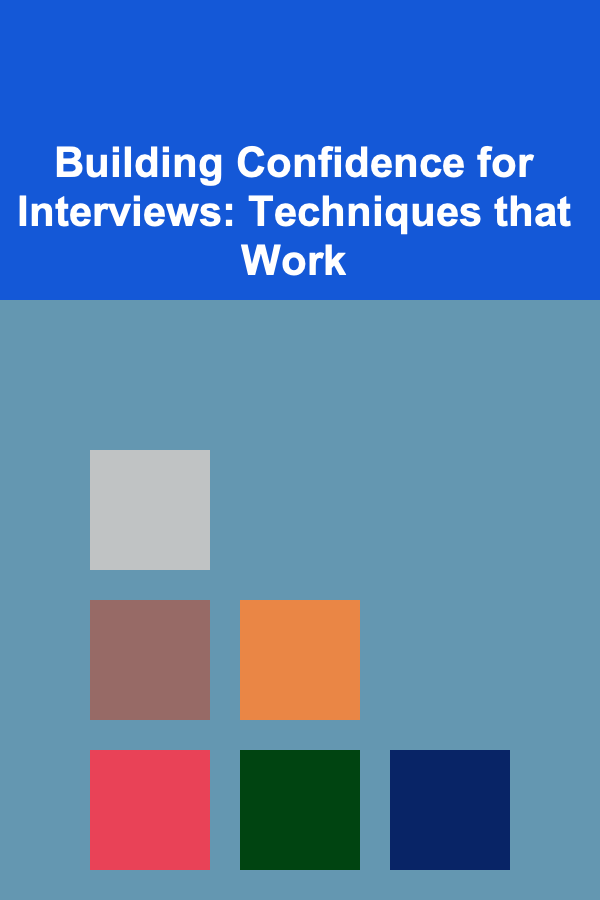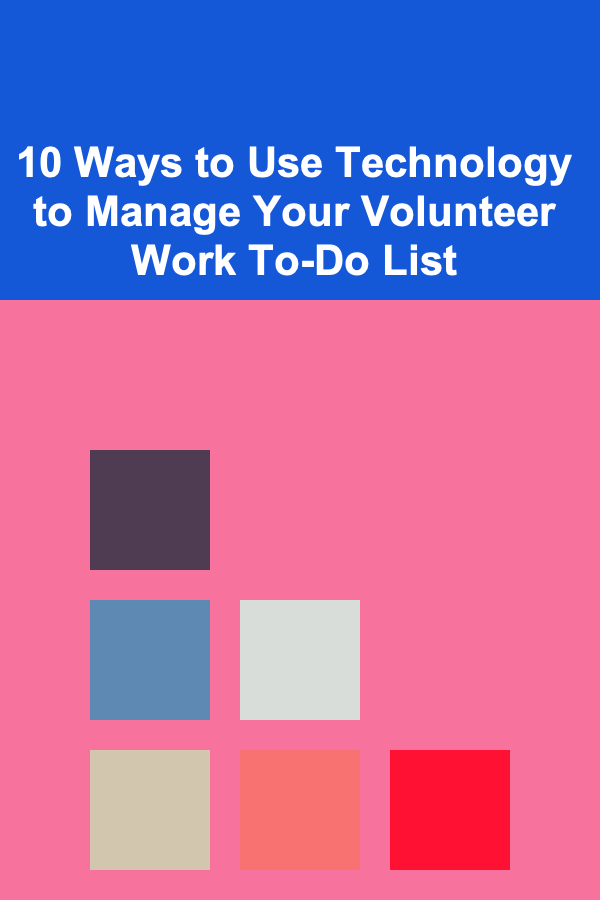
Building Confidence for Interviews: Techniques that Work
ebook include PDF & Audio bundle (Micro Guide)
$12.99$6.99
Limited Time Offer! Order within the next:

Interviews can be one of the most nerve-wracking parts of the job search process. The pressure of performing well, the fear of being judged, and the anxiety of not knowing what will come next can make even the most prepared candidates feel uneasy. However, confidence is a key ingredient in making a positive impression on interviewers. It's not about being perfect; it's about showcasing your skills, experiences, and personality in the best light.
Building confidence for interviews is a process that involves preparation, mindset, and practice. In this guide, we will explore actionable techniques that can help you feel confident, calm, and poised when it's time to face an interview.
Preparation is Key: Mastering Your Knowledge
Confidence doesn't come from wishing for it; it comes from being thoroughly prepared. The more prepared you are for the interview, the more confident you'll feel. Being knowledgeable about the company, the role, and your own qualifications will give you the foundation you need to answer questions with assurance.
Research the Company
Start by learning as much as possible about the company you're interviewing with. Look at their website, read about their mission, values, and culture. Explore recent news, press releases, or any industry-specific developments that might be relevant to your interview. Understanding the company's goals and challenges will allow you to position yourself as someone who can contribute meaningfully.
Actionable Steps:
- Study the company's products, services, and customers.
- Read recent news articles or blog posts about the company's developments or achievements.
- Look at reviews on Glassdoor or similar sites to get insights into the work culture.
Know the Role
Beyond understanding the company, delve into the specific role you're applying for. What are the key responsibilities? What skills are required? What problems is the company hoping you will solve in this position? The more you know about the role, the better you can tailor your responses to show how you are the perfect fit.
Actionable Steps:
- Review the job description in detail.
- Highlight the key skills and experiences the company is looking for.
- Prepare examples of your previous work that directly relate to the job requirements.
Reflect on Your Experience
Your personal experiences are your best selling points. Reflect on your work history, skills, and achievements. Prepare specific examples that demonstrate your abilities in various situations (e.g., problem-solving, teamwork, leadership). The STAR method (Situation, Task, Action, Result) is an excellent framework to organize these examples and ensure you can present them clearly during the interview.
Actionable Steps:
- Write down key achievements from your past roles.
- Use the STAR method to structure your responses to behavioral questions.
- Identify at least three examples that highlight your skills and accomplishments.
The Power of Positive Visualization
Visualization is a powerful mental technique that athletes and performers have used for years to improve performance. It involves imagining yourself succeeding in the interview. Positive visualization can help reduce anxiety, focus your mind, and build your confidence.
Visualize Success
Before the interview, take some time to close your eyes and visualize yourself walking into the interview room with a calm and confident demeanor. Picture yourself answering questions with clarity, discussing your qualifications with enthusiasm, and leaving the interview feeling proud of how well you did. The more vividly you imagine this successful scenario, the more likely you are to approach the interview with a confident mindset.
Actionable Steps:
- Spend 5-10 minutes before the interview visualizing yourself performing well.
- Imagine yourself handling difficult questions with ease and professionalism.
- See yourself leaving the interview with a sense of accomplishment.
Affirmations for Confidence
Positive affirmations are statements that reinforce a positive self-image. They can help reduce self-doubt and replace negative thoughts with empowering ones. Create a set of affirmations that remind you of your strengths, your qualifications, and your ability to succeed in the interview.
Actionable Steps:
- Write down three to five affirmations that highlight your strengths.
- Repeat these affirmations to yourself every day leading up to the interview.
- Use affirmations to counter any negative or self-doubting thoughts during the interview.
Practice, Practice, Practice
Confidence grows with practice. One of the most effective ways to build confidence for an interview is to simulate the interview experience before the actual day. Practice answering common interview questions and getting comfortable with speaking about your skills and experiences.
Mock Interviews
Mock interviews are a great way to practice answering questions in a structured setting. Ask a friend, family member, or mentor to conduct a mock interview with you. If you don't have anyone available, there are numerous online platforms that offer mock interview services. The feedback from these sessions can help you refine your responses and improve your delivery.
Actionable Steps:
- Schedule at least two mock interviews before the actual one.
- Ask for feedback on your answers, body language, and overall presentation.
- Incorporate any constructive feedback into your performance.
Record Yourself
Sometimes, it's hard to judge how you come across in an interview without seeing it for yourself. Set up a camera or use your phone to record yourself answering interview questions. Watching the recording will give you insight into your body language, tone, and speech patterns. This can help you identify areas for improvement and allow you to correct them before the actual interview.
Actionable Steps:
- Choose a few common interview questions and record yourself answering them.
- Watch the recording and note areas for improvement (e.g., posture, tone, pacing).
- Practice again, making adjustments based on your observations.
Manage Anxiety with Relaxation Techniques
It's completely normal to feel nervous before an interview. The key is managing that anxiety so it doesn't affect your performance. Implementing relaxation techniques can help calm your nerves and increase your confidence.
Deep Breathing
Deep breathing is a simple yet effective technique to reduce anxiety. It helps calm your nervous system and gives you a sense of control. Practice deep breathing before the interview to center yourself. It can also help you stay calm during the interview if you start to feel anxious.
Actionable Steps:
- Practice slow, deep breathing for a few minutes before the interview.
- Inhale for a count of four, hold for four, exhale for four, and repeat.
- Use deep breathing during the interview to stay calm if you feel your nerves rising.
Power Poses
The concept of "power poses" is rooted in body language research that suggests adopting expansive, confident postures can positively affect how you feel and how others perceive you. Before your interview, try standing in a power pose---like standing tall with your hands on your hips or stretching your arms wide like a superhero. Holding these poses for a few minutes can increase feelings of power and boost your confidence.
Actionable Steps:
- Practice power poses before your interview to feel more confident.
- Stand in a confident pose for a few minutes before you enter the interview room.
- Maintain good posture throughout the interview to project confidence.
Focus on the Conversation, Not the Outcome
Often, we become overly focused on the outcome of the interview---the desire to get the job, the fear of rejection, or worrying about how we'll be judged. Shifting your focus to the conversation itself can ease anxiety and help you stay grounded.
Shift from Self-Doubt to Curiosity
Instead of worrying about how you're performing, focus on the conversation. View the interview as a two-way exchange where you're learning more about the company just as they are learning about you. Cultivate curiosity about the role and the organization. This mindset can make you feel less like you're being evaluated and more like you're engaging in a meaningful discussion.
Actionable Steps:
- Approach the interview with a mindset of curiosity and learning.
- Ask insightful questions about the company and the role.
- Let go of perfection and focus on the quality of the conversation rather than the outcome.
Reframe Nervousness as Excitement
Instead of viewing nervousness as a negative emotion, try reframing it as excitement. Research shows that when we tell ourselves we're excited rather than anxious, our performance improves. The physical symptoms of nervousness (e.g., a racing heart, sweaty palms) are the same as those associated with excitement. By framing your nerves as excitement, you can harness that energy to perform better.
Actionable Steps:
- When you start feeling nervous, tell yourself, "I'm excited about this opportunity."
- Use the energy from your nerves to stay focused and enthusiastic during the interview.
- Focus on the excitement of the opportunity, rather than the fear of failing.
Conclusion
Building confidence for interviews takes time and practice, but the techniques outlined above can help you feel more prepared, calm, and confident when it's time to face your next interview. By investing time in preparation, practicing your responses, managing anxiety, and shifting your mindset, you can significantly improve your performance and increase your chances of success.
Remember, confidence doesn't mean being perfect. It's about being authentic, composed, and focused on showcasing your skills and experiences. With the right techniques in place, you'll be ready to step into the interview room with confidence and make a lasting impression.
Reading More From Our Other Websites
- [Personal Care Tips 101] How to Exfoliate Your Face Without Irritating Your Skin
- [Organization Tip 101] How to Keep Serving Utensils Within Reach
- [Home Space Saving 101] How to Choose the Perfect Loft Bed with Desk for Small Apartments
- [Organization Tip 101] How to Build a Custom Tool Belt for Garden Tasks
- [Beachcombing Tip 101] How to Distinguish Natural Sand Castles from Human‑Made Structures While Exploring
- [Organization Tip 101] How to Preserve Photographs for Your Time Capsule
- [Home Space Saving 101] How to Install and Use a Wall-Mounted Drying Rack for Space-Saving Laundry Solutions
- [Tie-Dyeing Tip 101] How to Choose the Perfect Fabric for Vibrant Tie-Dye Results
- [Star Gazing Tip 101] Seasonal Skywatching: How to Use a Star‑Gazing Calendar for Beginners
- [Home Budget 101] How to Implement Zero-Based Budgeting for Your Home Expenses

How to Avoid Common Pitfalls in Personal Financial Planning
Read More
How to Organize a Backpack for Maximum Efficiency
Read More
How To Improve Your Vocal Range and Power
Read More
10 Tips for Creating a New Year's Resolution To-Do List You'll Actually Stick To
Read More
How to Use a Daily To-Do List to Achieve Your Long-Term Goals
Read More
10 Ways to Use Technology to Manage Your Volunteer Work To-Do List
Read MoreOther Products

How to Avoid Common Pitfalls in Personal Financial Planning
Read More
How to Organize a Backpack for Maximum Efficiency
Read More
How To Improve Your Vocal Range and Power
Read More
10 Tips for Creating a New Year's Resolution To-Do List You'll Actually Stick To
Read More
How to Use a Daily To-Do List to Achieve Your Long-Term Goals
Read More